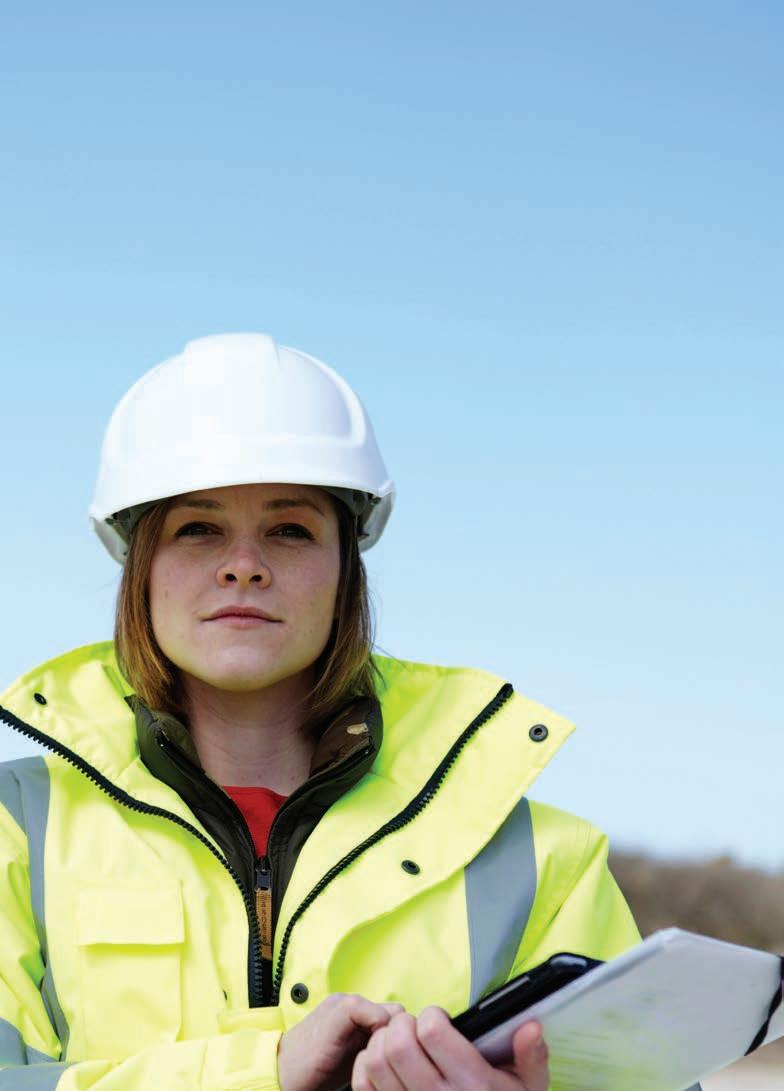
8 minute read
WOMEN AT WORK Stepping up
STEPPING UP After celebrating International Women’s Day on 8 March, IOSH talks to fi ve women who have risen to the top of the OSH profession about climbing the career ladder and the biggest challenges ahead.
DIANE CHADWICK-JONES, human performance director, BP
‘There were times early in my career where I felt disrespected or marginalised as a woman,’ says Diane. ‘I think we’ve moved on from that era by showing that women are front and centre in the workplace through our actions, and companies are emphasising inclusive behaviours.’
Most discrimination stems not from attempts to harm anyone, but from selective helping, she adds. ‘When we go out of our way to help someone who is similar to us, this is unconscious selective privileging that reinforces the status quo. That’s why conscious inclusion through mentoring is so important.’
Diane already mentors others: ‘I walk in their shoes to see different perspectives and learn how I can be more inclusive. The more inclusive we are, the more trust is built. The more that people feel able to speak about issues, the more we understand the hidden safety risks and the complexity of our problems and how to fi x them.’
DEBBIE COUSINS, head ESD operations, European Bank for Reconstruction and Development
‘I am constantly impressed by the women who are working within organisations raising awareness and ensuring safe practices on- and off-site,’ says Debbie. ‘I applaud those women who speak up for change or challenge the norm on safety – whether it be a female street cleaner, crane driver, construction manager or board director.’
But there’s more work to be done, particularly in the construction sector: ‘Sadly, I still fi nd a lack of basic welfare provisions on some projects, such as a lack of separate toilets and changing facilities, so suitable facilities for women also need to be addressed.’
Debbie points to the need for employers to adopt anti-harassment policies (including a policy on gender-based violence), a code of conduct and a system for workers to get redress for grievances, and to support them with training and awareness-raising activities. ‘While provisions to address sexual harassment are often included in legislation, businesses’ redress mechanisms and structures are often lacking, so sexual harassment cases can often go under-reported.’ ‘Employers should seek more gender balance in their staff composition and promote female role models in their visual media and training,’ she adds.
DR JUDITH GRANT, director of health and wellbeing, Mace Group
As a teenager, Judith was all set to begin an economics degree. She ended up changing direction after she lost six stone, graduating instead in sports science and becoming a personal trainer. Then injury struck and prevented her from working some of the time.
‘My experience of being off sick for a long time and unable to walk shaped my career. As much as I enjoyed personal training, I had all these people coming to me with back pain and stress from their work. I had seen just how health and work interact, and that is one is the main reasons I made the transition.’
For Judith, stress risk assessment and upskilling line managers to have conversations when they know someone is struggling is critical. ‘We know stress is rising, and the UK Health and Safety Executive says that stress and mental health have overtaken musculoskeletal disorders as the biggest risk. Burnout and stress go hand in hand with our 24-hour society and technology.’
CHAMPIONING WOMEN
On our way to the top
‘Believe in and champion yourself,’ says Dr Judith Grant. ‘You have to be your number one supporter, and that is not always easy. Have a look at how other people have progressed through their careers and talk to people who can help you.’
Finding your goals and objectives should be the fi rst step, and continually moving towards them should come second, according to Yuka Ujita. ‘The road may not be straight and making side stops is not a bad idea,’ she adds. ‘If you do not lose your direction and stick to it, eventually you will be back on the right track. Third, absorb and utilise everything you get on your way.’ Diane Chadwick-Jones says that how we respond when things go wrong matters, and building trust with colleagues is the key to success. ‘It is easy to think that accidents are usually caused by human error – but it’s often less of the “who” and more often a case of the “why” and “how” it happened,’ she says. ‘It’s about recognising that often people are just doing their best in diffi cult circumstances.’ Debbie Cousins is ‘a great supporter of learning on the job, so ensure that you seek out opportunities to observe or shadow OSH professionals at work in a broad range of situations. Don’t forget you can gain opportunities by offering your services on a voluntary basis.’ She also advises understanding the application and use of risk assessments, being fl exible, and fi nding a good sponsor. Those starting out should spend as much time in the fi eld as they can, agrees Mirai Chatterjee. ‘Public health is all about getting your hands dirty. You get insights from the fi eld and the grassroots,’ she says.
MIRAI CHATTERJEE, director of social security, Self-Employed Women’s Association (SEWA) in India
‘On construction sites in India, I often see women balancing between nine and 12 bricks on their heads, climbing up three fl oors and wearing fl ip-fl ops,’ says Mirai. ‘The women engaged in the informal workplace have OSH issues yet they work day after day, year after year, with no day off, and they also come up with creative alternatives, in terms of their work environment and safety.’
As part of SEWA, the national union for women in the informal economy in India, Mirai has seen fi rst-hand the extreme diffi culties working women face. ‘One woman harvesting wheat and having to look after her baby did what many Indian women do when there is no childcare service. She administered opium to her daughter so she would sleep. Unfortunately, she gave her too much, and the child went into respiratory distress. At SEWA we essentially crowdfunded in the village to send the child to hospital. That baby was fi ne and is now an adult – but it demonstrates what women have to balance to be able to work.’
However, progress has been made in understanding the OSH challenges women face in global supply chains. ‘The 2013 Dhaka garment factory fi re opened the eyes of the world,’ she says. ‘As a result, many organisations like ours have been in dialogue with large brands. Consumers are asking questions, which we are grateful for. But issues remain with contractors and middle agencies who do not ensure safe and fair working conditions.’
YUKA UJITA, OSH specialist, International Labour Organization (ILO)
Under the ILO’s Vision Zero Fund, many female workers, especially those in agriculture and textiles, have been equipped with OSH knowledge and control measures through participatory, actionoriented training,’ Yuka says.
She points out that the key challenge in the OSH sector is developing a comprehensive, multi-sectoral and multi-level approach. ‘Safety and health at work cannot be fully achieved only by preventive activities in the workplace but beyond. The safety and health of female workers are affected by multiple factors – including their social, economic and sometimes educational backgrounds – more so than for male workers. Therefore, we have to engage all stakeholders.’ Employers need to know what support women need, says Yuka, which can vary. ‘The fi rst step is social dialogue at the individual level between worker and employer. It should be followed by the social dialogue at the workplace level since some of the matters can/ should be solved with the support and cooperation of peer workers.’
SPEAKING UP
The biggest challenge I faced
1
2
3
4
5
‘I'm fortunate in that I don't believe that my gender has held me back or that I have experienced any discrimination. The only times that it's played a part is people's gender perceptions of occupational health, and I have had a strong network of men and women who have helped me to overcome that.’ DR JUDITH GRANT
‘Joining an oil company, I found that often I was the only woman in teams and meetings. I felt intimidated and scared to speak up. My pivotal moment was reading an article which explained that one of the greatest burdens people place on themselves when trying to fi nd their way in a company is when they act out of a selfimposed fear of what others may think. I changed overnight to prioritise my home life more, and be more outspoken at work.’ DIANE CHADWICK-JONES
‘Childcare was a very real issue for me. But I managed with a supportive partner, and I was fortunate working in an all-women union. And I was in a more favourable position because I could afford childcare.’ MIRAI CHATTERJEE
‘There is never enough time, and sometimes I’m constrained and confl icted – just as for any working mum, it is a continual balancing act. I have a supportive husband and parents, who enable me to put in the hours and travel as I do, plus the bank allows me to routinely work from home, so I know I am in a lucky position.’ DEBBIE COUSINS
‘The family/work balance has always been a challenge. But I love and want both professional work and housework. Consequently, I try to do everything I can do. As a result, I am a bit overworked and the housework I accomplish is far from complete.’ YUKA UJITA
IOSH Approved Coaching for safety
Be the best you can be
HIE London – Heathrow T5 London Road Slough SL3 8QB
Wednesday 1 st and Thursday 2 nd July 2020
General Manager thyssenkrupp Aerospace Milton Keynes
Better solutions Î less risk Better buy-in Î more ownership Better engagement Î safer behaviour
Call now!
t. 01706 217122 m. 0792 191 4099 e. michael@securushealthandsafety.co.uk










